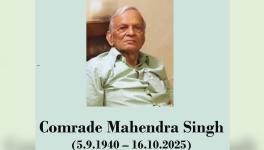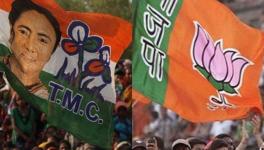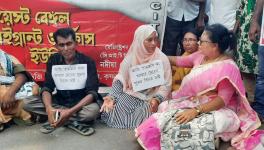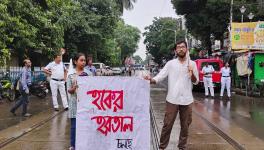Jyoti Basu’s 14th Death Anniversary Observed in West Bengal
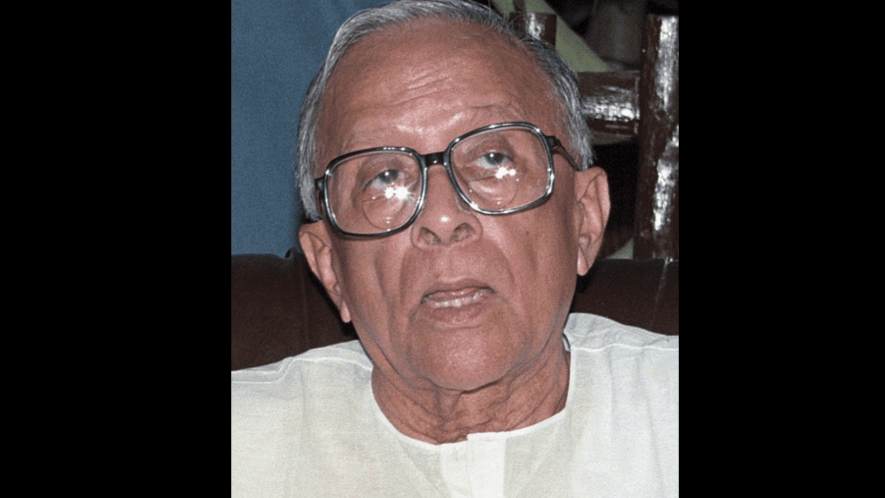
Jyoti Basu. Image Courtesy: Wikimedia Commons
Kolkata: Statesman Jyoti Basu’s 14th Death Anniversary was observed throughout West Bengal with dignity. In the Central programme of the day held at the ground earmarked for Jyoti Basu Centre for Social studies and Research at Newtown near Kolkata, a seminar was held which was participated by Left front leaderships.
Speakers of the event included the Communist Party of India (Marxist) (CPI(M) State Secretary MD Salim and Left Front Chairman Biman Basu. The Keynote speech at the event on Jyoti Basu's vision, the Panchayati system now and then, was delivered by CPI(M) Politburo Member Suryakanta Mishra. In the programme, two research papers- one on the state of Bengal’s economy in the last 12 years and another on the present condition of the Panchayati system in West Bengal, were handed over to the Chairman of the Jyoti Basu Centre of Social studies and research by Lead researcher DR Ishita Mukherjee. Artist Soumen Basu enthralled the audience with songs at the start of the programme.
In his reaction to NewsClick, Apromeyo Duttagupta a veteran Kolkata journalist, when asked about the contribution of Jyoti Basu, retorted back that Jyoti Basu was able to string the people's hearts in a single spectrum. In the field of politics, he was different from all his contemporaries because he could rightly understand the pulse of the common people. He rose to be the Chief Minister of West Bengal rising from street politics, he had got umbilical relations with rural people who used to connect with him in an unprecedented way. This helped him to be CM of the state for 24 years at a stretch
In the year 1975 in the wake of the massive mass struggle Ms Indira Gandhi was forced to withdraw the emergency and go for election. Her party was wiped out from the political map of India. In 1977, West Bengal State Legislature election was held giving a thumping majority to the left front. Jyoti Basu being the leader of the front became the Chief Minister.
Since then he showed a new trend in the Indian Parliamentary Democracy. Because of Congress's misrule and deliberate discriminatory attitude, the economic condition was in shambles in the state. Jyoti Basu as the leader of the CPI(M) and left front knew that decentralisation of power and strengthening of local government would ensure the benefit of development at the grass root level. His comments on the date of the Oath taking as Chief Minister, were that the government would be made effective by decentralisation and power would not remain concentrated in Writers’ Buildings.
Ceiling excess land and distribution thereof to the landless poor peasants could be made successful through Panchayati Raj. The new Panchayat Act and the Municipal Act, particularly the Kolkata Municipal Corporation Act, of 1980 have now become the model in the country. Reforms in these areas got immediate reflection in the economic field. Food deficit West Bengal became a food surplus state and in fact, in some of the agricultural products W.B tops the list. Gradually, the poverty level has gone down, the village economy got strengthened. The contribution of Jyoti Basu in these fields has been recognised not only by Scholars from various sectors but the poor people also by reposing their faith repeatedly on him.
Another important step he took is to make West Bengal self-sufficient in electricity and Operation Barga. In 1977 when he assumed office then West Bengal’s power position was abysmally poor. People from other states used to ridicule WB. Jyoti Basu took the Bull with the horn and turned the table making the state self-sufficient in power. He was respected by all the political leaders, even, at the national level. Whenever the Country was in a political crisis he was in hand to give his suggestion and advice to the government at the Centre.
The Left Front rule has been responsible for momentous changes in the West Bengal countryside. Over the 23 years of Basu's leadership, it implemented basic land reform, established India's first comprehensive system of democratic decentralisation, and extended rural electrification and irrigation.
Agricultural production came out of the impasse in which it had been trapped for decades before Left rule, and in the 1980s and 1990s, West Bengal showed the highest rates of agricultural growth among the 17 most populous states of the country. As a consequence of the new institutional changes and agricultural growth, nutrition levels improved and rural poverty declined in the State. In fact, West Bengal, followed by Kerala, has the best record among all Indian States with respect to rural poverty reduction over the past two decades.
Secondly, despite the concerted propaganda efforts in the media to give the Basu government a bad name, West Bengal is a living example of democracy at the grassroots. There have been elections to panchayat institutions every five years since 1978, panchayats have taken on responsibilities that were earlier vested with the district-level bureaucracy, and the divisible outlay for the districts tends to be close to 50% of State Plan outlays. Elected members of panchayats are overwhelmingly from land-poor and landless households. The West Bengal experience with local government was the primary impetus for the 73rd and 74th Amendments to the Indian Constitution, which made regular elections to local bodies, rural and urban, mandatory in all states.
Delivering his Keynote address in the programme Dr Suryakanta Mishra who for a prolonged period was the Panchayat and rural development minister said that the Left Alternative should be taken amidst the people. He also highlighted the fact that during the time of semi-fascist terror in 1972 the left did not participate in the Assembly. In one word there was no representative of the left in the assembly.
Still, in 1977 the Left earned a clean sweep in the elections. In his speech, Suryakanta Mishra also elaborated on the role played by Jyoti Basu in administering the Panchayati system of the state. He said that one should not judge Jyoti Basu by the fact that Jyoti Basu was the opposition leader, he was chief minister, and he could be the Prime minister.
It should be remembered that in 1971 too there could be a left-front government in the state, but that did not happen due to rampant irregularities and vote loot. After coming to office in 1977, Jyoti Basu had said that we will not govern from the writers building. The decision to hold the panchayat election was another thing that ensured the participation of all stakeholders in rural governance.
He also mentioned the various advancements made by the Left Front government during the times of Jyoti Basu and that one should take lessons from Jyoti Basu to know about what needs to be done today. “We should reinstate in the listener's mind the success that we had earned during administering the left-front government,” he said.
“We should reunite people by enthusing them about the left alternative. We don’t have our government now. Regarding how we can run our panchayats and municipalities, we can rely on the Taherpur model,” he added. He also elaborated on the work done by the left activists during the pandemic and called it a source of inspiration.
Speaking in the seminar, CPI(M)State secretary Md Salim said that now central teams to monitor state governments', works are busy crisscrossing the state. It is also a fact that 27 central projects are administered through the village panchayats. “Though we had written to them a couple of times, the centre has ignored our plea on the subject. The central government in reality does not want to put the Trinamool Congress (TMC) government under real scanner as the TMC government is itself a franchisee of the BJP-run Central government.
Left front chairman Biman Basu, also the Chairman of Jyoti Basu Centre for social studies and Research today went to the houses of the rural population near the venue before attending the programme at the venue. In the programme, he shared his conversation with the villagers, who admitted that real development in the area had been done during the times of the left front. The role of the Basu government in giving voting rights to 18-year-olds in the country , a decision which was later carried out in the entire country was also highlighted by Biman Basu in the programme.
Get the latest reports & analysis with people's perspective on Protests, movements & deep analytical videos, discussions of the current affairs in your Telegram app. Subscribe to NewsClick's Telegram channel & get Real-Time updates on stories, as they get published on our website.















